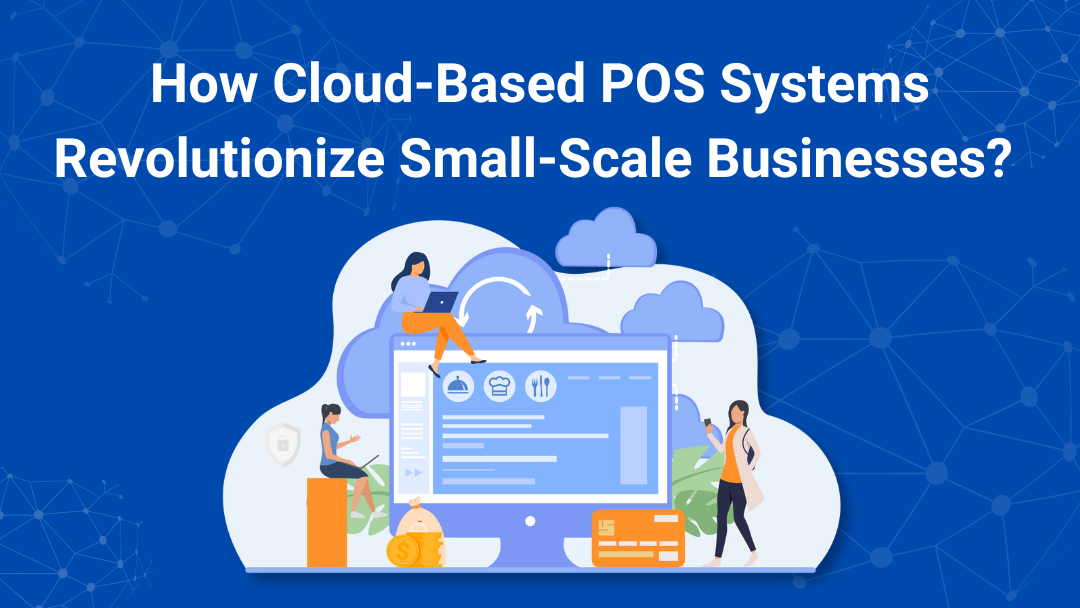How Cloud-Based POS Systems Revolutionize Small-Scale Businesses?
Cloud POS systems are helping small-scale businesses thrive by providing the technology needed to compete and grow in today’s digital world. However small-scale business owners are still skeptical about switching to cloud POS from a traditional system.
This research article is for all such small business entrepreneurs, as it will clear all their doubts and help revolutionize their small-scale business.
What is a cloud pos system?
A cloud POS (Point of Sale) system is an internet-based software that allows businesses to process transactions and manage operations using devices like tablets or computers. Unlike traditional POS systems that store data locally, cloud POS systems store data on remote servers, accessible from any location with an internet connection. This enables real-time access to sales, inventory, and customer data. Cloud POS systems offer easy updates, enhanced security, multi-location support, and integration with other business tools. They are popular in retail, restaurant, and service industries due to their flexibility, scalability, and cost-effectiveness.
What makes a good cloud pos system?
A good cloud POS system has several key characteristics that make it efficient, reliable, and beneficial for businesses. These include:
1) Ease of Use: The interface should be intuitive, allowing staff to learn and use it with minimal training quickly.
2) Real-Time Data Access: It should provide real-time updates on sales, inventory, and customer data, accessible from anywhere.
3) Security: Strong encryption, regular backups, and compliance with data security standards (like PCI DSS) are crucial for protecting sensitive business and customer information.
4) Customization: The system should be customizable to meet the specific needs of different industries, like retail, restaurants, or services.
5) Integration: Seamless integration with other business software (e.g., accounting, CRM, eCommerce) enhances efficiency and reduces manual work.
6) Scalability: A good cloud POS should easily accommodate business growth, such as adding more locations or handling more transactions without performance issues.
7) Offline Functionality: It should offer an offline mode so businesses can continue processing transactions during internet outages.
8) Customer Support: Reliable technical support is essential, especially during setup and troubleshooting.
9) Cost-Effectiveness: A good system should offer a reasonable pricing structure, ideally subscription-based, with a clear value for its features.
10) Reporting & Analytics: Advanced reporting features help businesses make data-driven decisions and optimize operations.
What are the benefits of a cloud-based POS system for small-scale businesses?
A cloud-based POS system offers several key benefits to small-scale businesses:
1) Low Upfront Costs: Cloud POS systems typically use a subscription-based pricing model, avoiding the large upfront costs of traditional POS hardware and software. This makes it more affordable for small businesses.
2) Ease of Setup & Use: With minimal hardware requirements and intuitive interfaces, cloud POS systems are easy to implement and use, reducing the need for extensive training.
3) Access from Anywhere: Owners and managers can monitor sales, inventory, and customer data remotely in real-time, allowing greater flexibility and control over the business.
4) Scalability: Cloud POS systems grow with the business. Adding users, locations, or features can be done easily without replacing hardware or major upgrades.
5) Automatic Updates & Maintenance: Software updates are managed by the provider and applied automatically, keeping the system up to date without requiring business downtime or IT expertise.
6) Security & Backups: Data is stored securely in the cloud, with encryption and regular backups, reducing the risk of data loss or security breaches common with local systems.
7) Integration with Other Tools: Many cloud POS systems integrate with accounting, eCommerce, and inventory management software, streamlining operations and reducing manual data entry.
8) Inventory & Sales Management: They offer advanced features for tracking inventory and sales, providing insights that help small businesses manage stock and optimize operations more efficiently.
9) Improved Customer Experience: With fast transaction processing, loyalty programs, and personalized offers, cloud POS systems can enhance customer satisfaction and retention.
Should you invest in a cloud POS system?
Investing in a cloud POS system can be a smart decision, especially if it aligns with your business needs and growth plans. Here are factors to consider when deciding whether to invest in a cloud POS system:
Reasons to Invest:
1) Cost-Effective: Cloud POS systems generally require lower upfront investment compared to traditional systems, making them ideal for small businesses or startups.
2) Flexibility & Scalability: If your business is growing or has plans to expand, a cloud POS can easily scale to accommodate more users, locations, or features without major upgrades.
3) Remote Access: For businesses that require owners or managers to monitor operations remotely, a cloud POS provides real-time access to sales, inventory, and performance data from any device.
4) Automatic Updates & Maintenance: Cloud POS systems offer automatic software updates and backups, saving you time and reducing the need for IT personnel.
5) Security: With cloud storage, your data is securely stored and backed up regularly, reducing the risk of data loss due to hardware failures or theft.
6) Integration with Other Tools: If you use other business tools (e.g., accounting, CRM, eCommerce), a cloud POS can streamline operations through integrations, saving time and effort.
7) Advanced Analytics: Many cloud POS systems provide detailed reporting and analytics, helping you make informed business decisions, improve efficiency, and boost profitability.
Reasons to Reconsider:
1) Excellent Internet Connection: Network stability is essential for cloud point-of-sale systems. If your internet is unreliable or prone to outages, this could disrupt transactions unless the system offers offline functionality.
2) Subscription Costs: While cloud POS systems have lower initial costs, the ongoing subscription fees may add up over time. Make sure the long-term cost aligns with your budget.
3) Data Privacy: Storing data in the cloud means trusting the provider with sensitive business and customer information. Be sure to choose a system with robust security protocols.
SUMMING UP
Cloud-based POS systems are transforming how small-scale businesses operate, offering more flexibility, efficiency, and cost savings compared to traditional systems.
If your business values flexibility, cost savings, real-time access, and scalability, investing in a cloud POS system is likely a smart move. However, you should carefully consider the reliability of your internet and evaluate the long-term costs before making a decision.

